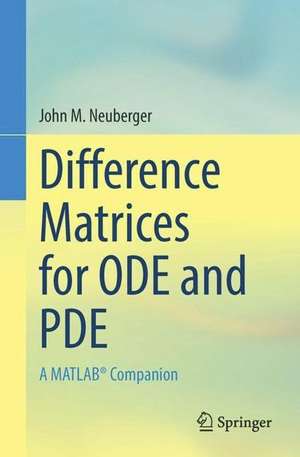Difference Matrices for ODE and PDE: A MATLAB® Companion
Autor John M. Neubergeren Limba Engleză Paperback – 20 ian 2023
In addition to its special focus on solving in MATLAB, the abundance of examples and exercises make this text versatile in use. It would serve well in a graduate course in introductory scientific computing for partial differential equations. With prerequisites mentioned above plus some elementary numerical analysis, most of the material can be covered and many of the exercises assigned in a single semester course. Some of the more challenging exercises make substantial projects and relate to topics from other typical graduate mathematics courses, e.g., linear algebra, differential equations, or topics in nonlinear functional analysis. A selection of the exercises may be assigned as projects throughout the semester. The student will develop the skills to run simulations corresponding to the primarily theoretical course material covered by the instructor. The book can serve as a supplement for the instructor teaching any course in differential equations. Many of the examples can be easily implemented and the resulting simulation demonstrated by the instructor. If the course has a numerical component, a few of the more difficult exercises may be assigned as student projects.Established researchers in theoretical partial differential equations may find this book useful as well, particularly as an introductory guide for their research students. Those unfamiliar with MATLAB can use the material as a reference to quickly develop their own applications in that language. Practical assistance in implementing algorithms in MATLAB can be found in these pages. A mathematician who is new to the practical implementation of methods for scientific computation in general can learn how to implement and execute numerical simulations of differential equations in MATLAB with relative ease by working through a selection of exercises. Additionally, the book can serve as a practical guide in independent study, undergraduate or graduate research experiences, or for reference in simulating solutions to specific thesis or dissertation-related experiments.
Preț: 358.40 lei
Nou
Puncte Express: 538
Preț estimativ în valută:
68.58€ • 73.34$ • 57.18£
68.58€ • 73.34$ • 57.18£
Carte disponibilă
Livrare economică 28 martie-11 aprilie
Livrare express 13-19 martie pentru 31.19 lei
Preluare comenzi: 021 569.72.76
Specificații
ISBN-13: 9783031119996
ISBN-10: 3031119991
Pagini: 204
Ilustrații: XIV, 204 p. 73 illus., 43 illus. in color.
Dimensiuni: 155 x 235 x 13 mm
Greutate: 0.36 kg
Ediția:1st ed. 2023
Editura: Springer International Publishing
Colecția Springer
Locul publicării:Cham, Switzerland
ISBN-10: 3031119991
Pagini: 204
Ilustrații: XIV, 204 p. 73 illus., 43 illus. in color.
Dimensiuni: 155 x 235 x 13 mm
Greutate: 0.36 kg
Ediția:1st ed. 2023
Editura: Springer International Publishing
Colecția Springer
Locul publicării:Cham, Switzerland
Cuprins
1. Introduction.- 2. Review of elementary numerical methods and MATLAB(R).- 3. Ordinary Differential Equations.- 4. Partial Differential Equations.- 5. Advanced topics in semilinear elliptic BVP.- References.
Notă biografică
John M. Neuberger is Professor of Mathematics in the Department of Mathematics and Statistics, College of Engineering, Forestry, and Natural Sciences at Northern Arizona University.
Textul de pe ultima copertă
The use of difference matrices and high-level MATLAB® commands to implement finite difference algorithms is pedagogically novel. This unique and concise textbook gives the reader easy access and a general ability to use first and second difference matrices to set up and solve linear and nonlinear systems in MATLAB which approximate ordinary and partial differential equations. Prerequisites include a knowledge of basic calculus, linear algebra, and ordinary differential equations. Some knowledge of partial differential equations is a plus though the text may easily serve as a supplement for the student currently working through an introductory PDEs course. Familiarity with MATLAB is not required though a little prior experience with programming would be helpful.In addition to its special focus on solving in MATLAB, the abundance of examples and exercises make this text versatile in use. It would serve well in a graduate course in introductory scientific computing for partial differential equations. With prerequisites mentioned above plus some elementary numerical analysis, most of the material can be covered and many of the exercises assigned in a single semester course. Some of the more challenging exercises make substantial projects and relate to topics from other typical graduate mathematics courses, e.g., linear algebra, differential equations, or topics in nonlinear functional analysis. A selection of the exercises may be assigned as projects throughout the semester. The student will develop the skills to run simulations corresponding to the primarily theoretical course material covered by the instructor. The book can serve as a supplement for the instructor teaching any course in differential equations. Many of the examples can be easily implemented and the resulting simulation demonstrated by the instructor. If the course has a numerical component, a few of the more difficult exercises may be assigned as student projects.
Established researchers in theoretical partial differential equations may find this book useful as well, particularly as an introductory guide for their research students. Those unfamiliar with MATLAB can use the material as a reference to quickly develop their own applications in that language. Practical assistance in implementing algorithms in MATLAB can be found in these pages. A mathematician who is new to the practical implementation of methods for scientific computation in general can learn how to implement and execute numerical simulations of differential equations in MATLAB with relative ease by working through a selection of exercises. Additionally, the book can serve as a practical guide in independent study, undergraduate or graduate research experiences, or for reference in simulating solutions to specific thesis or dissertation-related experiments.
Caracteristici
Develops the reader's scientific computing skills by sequentially coding the examples and exercises Each exercise builds on previous codes and new code fragments Method is applied to many classic ODE and PDE problems, each compared with classic methods
